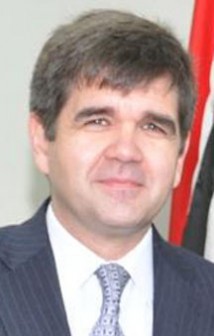CARICOM recently welcomed Ambassador Joaquín de Arístegui as the new Plenipotentiary Representative of Spain to CARICOM at an accreditation ceremony during which he said the regional body needed to be more active in multilateral organisations.
Ambassador de Arístegui’s accreditation comes less than a month after Miguel Ángel Moratinos, the former Foreign Minister of Spain met with CARICOM Foreign Ministers in Grenada in the margins of the recent Inter-Sessional meeting of the CARICOM Heads of Government, the CARICOM Secretariat at Turkeyen said in a press release.

At that meeting, Moratinos presented his candidature for the post of Director General of the United Nations Food and Agricultural Organisation (FAO) to the ministers.
Ambassador de Arístegui in presenting his letters of credence to CARICOM’s Secretary-General (ag) Ambassador Lolita Applewhaite endorsed CARICOM as “one of the best examples of integration.”
“Spain is a firm believer in the benefits and the added value of integration among countries that share common interests. We believe that CARICOM is not only one of the best examples of integration, but it is probably one of the crucial challenges that the region has to face in order to consolidate its growth and well being,” Ambassador de Arístegui is quoted as saying.
He noted also that Spain was “well aware” of the role of CARICOM in bi-regional dialogue with the European Union (EU).
As a net contributor to the EU, de Arístegui said that Spain believed that the consolidation and deepening of bi-regional dialogue between CARICOM and EU was fundamental to obtaining what other countries involved in that dialogue wanted, such as trade and political cooperation.
Against this backdrop, he said that Spain during its EU Presidency had begun to “put CARICOM where it belongs in the context of EU-Caribbean dialogue,” evidenced in the Latin America and the Caribbean (EU-LAC) Summit in Madrid in May 2010.
Beyond the EU-CARICOM bi-regional dialogue, he said that Spain considered that CARICOM needed to be more active in the global multi-lateral dimension.
To that end, it was keen on deepening CARICOM’s involvement within multilateral organisations like the United Nations.
Next stage
Meanwhile, the ambassador noted that his country was “very happy” to announce that it will convene the 3rd CARICOM-Spain Joint Commission which is a step that is “probably the test against which the next stage of relations will be measured.”
He said that Spain wants to move one gear up in its relations with CARICOM and to be able to identify areas of cooperation in the context of the next Joint Commission.
In accepting the credentials of the Plenipotentiary Representative, Ambassador Applewhaite recalled that the long history between CARICOM and Spain had been re-energised in 1999 through the First CARICOM-Spain Summit in Trinidad and Tobago which has been followed by three others as well as two meetings of the CARICOM-Spain Joint Commission which had been established by that first summit.
She noted that “practical projects” had come out of the Agreement on Scientific and Technical Cooperation between Spain and CARICOM signed at the 1999 Summit and they had “positively affected” the people of CARICOM member states.
These projects have been and continue to be implemented in such diverse and critical areas as water and sanitation, health and non-communicable diseases, agricultural development, fisheries, tourism, services, electoral observation and other key economic and social areas.
Spain has also provided support for the diplomatic and Spanish language training of officials across the region.
The Caribbean Community, she said, anticipates the convening of the 3rd CARICOM-Spain Joint Commission to allow for review and determination of areas for future cooperation which would exploit the synergies between Spain and the region.
These would allow for transfer of knowledge and technology and for the development of capacity and implementation of actions resulting in tangible improvements in the lives of the people of CARICOM’s member states.
Investing
Spain has also been investing significantly in the region and in so doing has been assisting in the strengthening of one of the most important sectors of its economy – tourism.
Having seen the benefits accruing to their counterparts, Applewhaite expressed confidence that more Spanish firms would be encouraged to make the Caribbean Community their choice for investment.
And through the Summit process, Spain has indicated its willingness to support the agenda of Small Island Developing and Low-lying Coastal States (SIDS) as well as the special needs of vulnerable economies, such as in this region, in international financial and co-operation fora in which the community does not have a presence, Applewhaite said.
Further, she noted the region’s “deep appreciation” to the people and government of Spain for its continued support in facilitating the re-development of Haiti, the release added.









